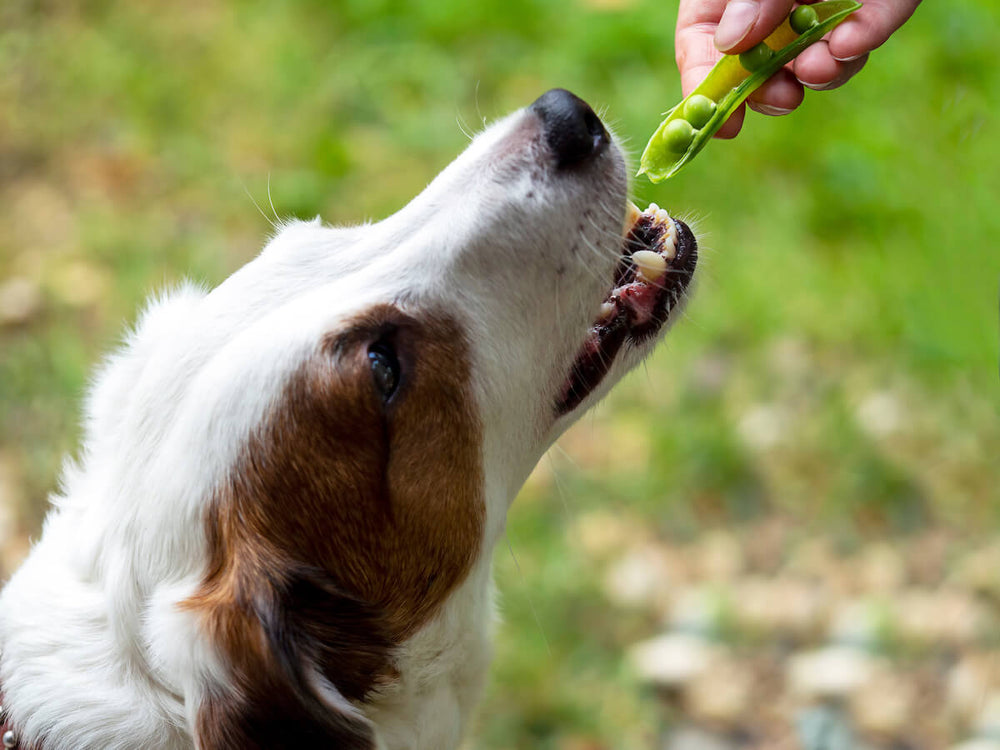Have you ever looked at the ingredients list on your dog’s food packaging? In dry kibble, canned dog food, and fresh food recipes, you’ll probably see several human foods included. And peas are likely to be one of them.
Can dogs eat peas? Yes. They’re a relatively common ingredient used in commercial dog food, along with vegetables like carrots and potatoes. And dogs can eat fresh peas, too. Peas provide dogs with many of the same nutrients and health benefits that it gives us. Remember: Our canine friends are omnivores, able to derive nutrition from both plant and animal sources.
With that being said, there are some precautions to take when feeding your dog peas. Peas might be small, but they do present a few risks. Keep reading to learn more about the health benefits of peas for dogs, what risks are involved, and how to feed your dog peas in safe way.
Health Benefits of Peas for Dogs

Most of the same kinds of peas that humans consume — green peas, snow peas, English peas (sometimes called garden peas), sugar snap peas, etc. — are healthy for dogs and offer nutritional value.
Some of the types of nutrients peas offer our dogs are:
Vitamins
Peas are a good source of vitamins for dogs, such as Vitamin A, Vitamin C, Vitamin K, and the B vitamins. Vitamins like these, of course, are important for a wide variety of bodily functions, from skin and coat health to energy production, strong bones and teeth, and digestive function, just to name a few.
Minerals
Can dogs eat peas as a good source of minerals? Absolutely. Peas contain various minerals that are essential to your dog’s health, including:
- Magnesium: Magnesium helps provide your dog with energy and is also necessary for normal nerve and muscle function.
- Manganese: This nutrient is also important for energy production, and it metabolizes protein and carbohydrates and plays a role in healthy bones and joints.
- Iron: Iron helps your dog’s red blood cells carry oxygen throughout the body.
- Zinc: Zinc is essential for a range of bodily functions including immune system health, thyroid function, and skin, eye, and brain health.
- Potassium: This electrolyte aids in the functioning of electrical charges in the muscles, nerves, and heart. It also moves water in and out of your dog’s cells, aiding in proper hydration.
Protein and Fiber
Peas are a low-calorie food that contain a fair amount of protein, which helps your dog’s body build and repair muscles and is also important for energy production. Peas, like other legumes, also contain a high amount of fiber. Fiber is important for regulating your dog’s digestive health and also helps your pooch to feel full when they’ve eaten a meal.
Looking for a way to give your dog’s digestive health a boost? Try Native Pet’s Pumpkin Powder. It can help support your dog’s healthy digestive system by regulating bowel movements, alleviating diarrhea, and assisting with the absorption of nutrients.
Antioxidants
Peas are also chock-full of antioxidants like beta-carotene (a precursor to Vitamin A) and lutein, which are both great for your dog’s skin, heart, and eye health. Antioxidants, as the name suggests, fight oxidation around your dog’s body — they battle free radicals, which cause damage to the cells, and support a healthy immune system. Antioxidants help support brain health and may even prevent the effects of cognitive decline and issues like dementia as dogs get older.
Risks of Peas for Dogs

Can dogs eat peas? Yes, and they can get plenty of nutrition out of these tiny legumes. But it’s important to realize that peas, as is the case with most human foods, have the potential to cause problems if you’re not careful.
The risks of peas include:
Choking Hazard
While a single pea isn’t likely to make even the smallest dog choke, choking is still worth considering. Eating large amounts of peas at once, especially tough and fibrous pea pods encasing peas, can be a choking hazard for your dog. It’s especially likely if your pup is the type to gulp down food when it’s given to them.
Purines
Peas contain a naturally occurring chemical compound called purines, which produce a substance known as uric acid. In moderate amounts, your dog’s kidneys can filter it out with no problem. But too much uric acid has the potential to cause kidney problems, including kidney stones. A dog that has pre-existing kidney issues should never be given peas, just to be safe.
Canned Peas
Can dogs eat peas that come in a can? No, it’s not a good idea. Various canned veggies, peas included, can be bad for dogs because of the extra sodium, preservatives, and other additives that they might contain.
How to Feed Your Dog Peas Safely

Yes, dogs can eat peas. But these little legumes do present some risks for your four-legged friend. So, how can dog owners feed their pets peas safely? Here’s how to do it:
- Feed plain, fresh peas. Fresh green peas with no seasonings, butter, or fat added are best for your dog. Skip other types of peas like canned varieties, and avoid pea pods, too. Frozen peas are also fine, as long as you separate the peas instead of offering a large chunk that has frozen together.
- Feed in moderation. Don’t give your dog a lot of peas at once, because the fiber content could make your dog gassy or lead to constipation. Because of the risk of kidney problems, don’t give your dog peas on a consistent basis. Consider peas the occasional treat for your pet. This is a good rule of thumb to follow whenever you’re giving your dog safe human food.
- Try adding peas to meals. Some dogs like peas served up as dog treats one by one, while some might like a few peas mixed in with their regular pet food. Just remember to feed peas to your dog in moderation either way.
Can Dogs Eat Peas? Here’s What to Remember

Can dogs eat peas? Yes, occasionally including peas in your dog’s diet is safe. Peas offer dogs a variety of nutrients, like vitamins, minerals, protein, fiber, and antioxidants. They’re low-calorie, too. It’s no wonder that peas are often included in the ingredients list of commercial dog food.
Peas do present a few risks for pet parents to be aware of. Like any new food introduced to your dog, too much at once can cause issues like constipation. They can also be a choking hazard, along with tough pea pods, which you should stay away from. Large amounts of peas can also give your dog too much uric acid at once, potentially causing kidney issues. Additionally, stay away from canned peas so you’re not inadvertently giving your dog preservatives or large amounts of sodium.
Feed peas to your dog in a safe way by giving them plain, fresh peas, keeping the portion size and frequency very limited, and mixing in peas alongside regular dog food.
Would you like to know about other human foods that dogs can eat? Visit the Native Pet blog for more articles.




